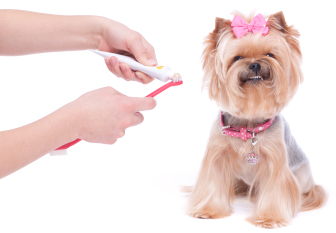 I’m going to share something personal with you… so please try not to judge me too harshly!
I’m going to share something personal with you… so please try not to judge me too harshly!
The truth is, I’m a bit obsessive about brushing my own teeth. I must brush five or six times a day – pretty much every time I eat something. I don’t know how I got started with so much brushing… it’s just something I do. But I can’t seem to do it for any of our dogs… not even the ridiculously pampered Yorkshire terrier Little Caesar!
I’m sharing this with you because I want you to know that you’re not alone if you sometimes forget that your pampered pet has teeth. But I’ve been feeling especially guilty lately because we’ve had a rash of really tough dental cases at Noah’s. Cases where, by the time we got in to clean those teeth, the patient lost way more teeth than they have left to eat with—- and some especially catastrophic cat mouths (if you’ll pardon the pun).
What I’d like to get you thinking about now is– what shape is your pet’s mouth in? It’s not always easy to tell with the naked eye.
Think of the advantages our human dentists get. Twice a year cleanings, full x-rays of the mouth every two years, and best of all – patients who can tell you where it hurts!
On the veterinary side – we do the best oral exam your pet will permit during our annual physical examination. If your pet is over seven years old, we’ll even try to get you in twice yearly for check ups. Finding cracked teeth, or teeth that now need a dental cleaning is one of our most frequent “catches”.
What we don’t get to do is clean those teeth twice a year, or take any preventative x-rays to see if there’s hidden disease. And for the most part, your pet can’t tell us they have a toothache. But make no mistake, your pets do feel the same pain you feel from cracked and broken teeth, and periodontal disease.
There’s a global initiative that’s begun with a group of human physicians, veterinarians, and public health officials called the One Health Initiative. Its mission is to bring together experts from around the globe who recognize that human health, animal health, and the health of the planet are all interconnected.
We talk about this concept all the time during visits. The foundation of great health for us is the same for our pets. We have strikingly similar nutritional, physical, and psychological needs. And dental health is just as important to your pet’s overall health as it is to ours. Dental disease is not only painful – it can “seed” heart, kidney and liver disease.
I know all about the issue, so why don’t I get the toothbrush out and take care of the 10 – 15 mouths we have at our house on any given day? Well, the truth is, we’re all busy, and when it comes to the teeth of our pets — out of sight is very often out of mind!
So what’s a responsible pet parent to do?
Here are Dr. Todd’s tips for dental health:
Don’t wait for trouble: Horrible breath, loss of weight, heavy accumulation of plaque, teeth that are already loose are all signs of periodontal disease. Be sure to bring your pets in for their yearly physical exams. With regular dental cleanings we can prevent tooth loss and disease.
Prevent Pain: Dogs and cats are generally quite stoic, and don’t show pain until disease is quite advanced. It’s very common to see pets act years younger after a dental cleaning and extraction of diseased teeth – they’ve been in chronic pain, and after treating dental disease they feel much, much better.
Feed a high quality diet: Low cost commercial diets and treats have added sugar. Sugar wreaks the same havoc on pet teeth as ours. Dry food and kibble diets crumble, mix with saliva and can stick at the gum line contributing to periodontal disease. We recommend fresh marrow bones* to help keep teeth and gums healthy between cleanings . Pets eating a raw diet, for a number of reasons, are less prone to dental disease. (*We have fresh bison marrow bones available at Noah’s Ark.)
Maintain teeth between cleanings: We have multiple additives and solutions to help slow plaque progression. If your pets will allow it, brush teeth daily. Click for detailed instructions for canines and felines.
Don’t neglect your cats: We’ve written in other newsletters about how it’s healthier to feed fresh or canned food to cats. If you feed your cats a dry feline diet, expect them to need professional dental cleaning each year.
We do our best to keep dental cleaning very affordable because it’s such an important part of overall health. The GOLD wellness plan includes a dental cleaning for just $55 per month.
I’m going to go now and try to brush some teeth besides my own!
